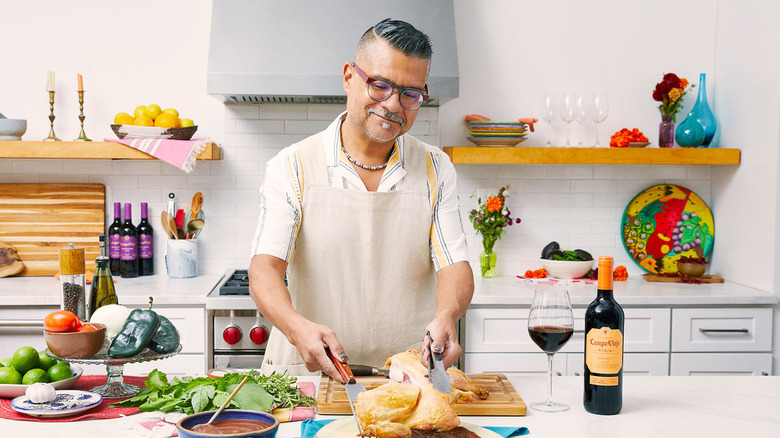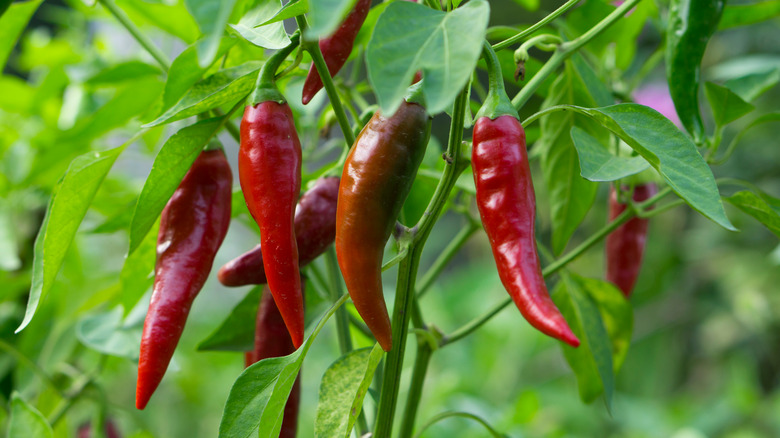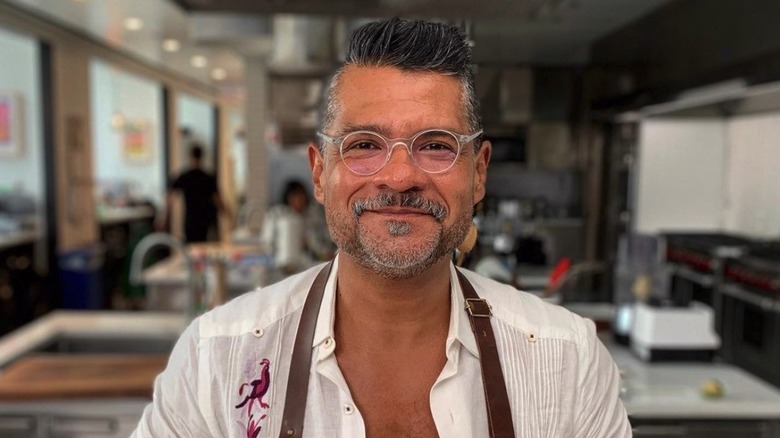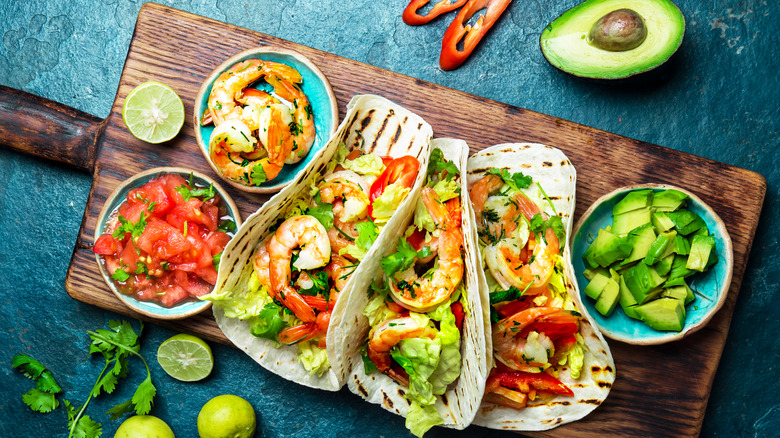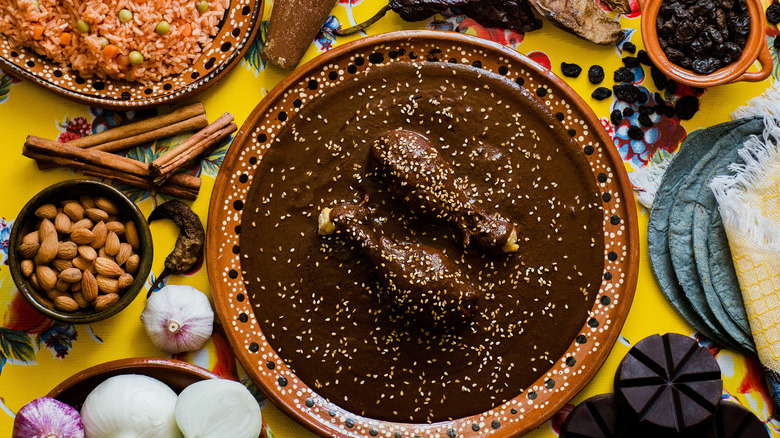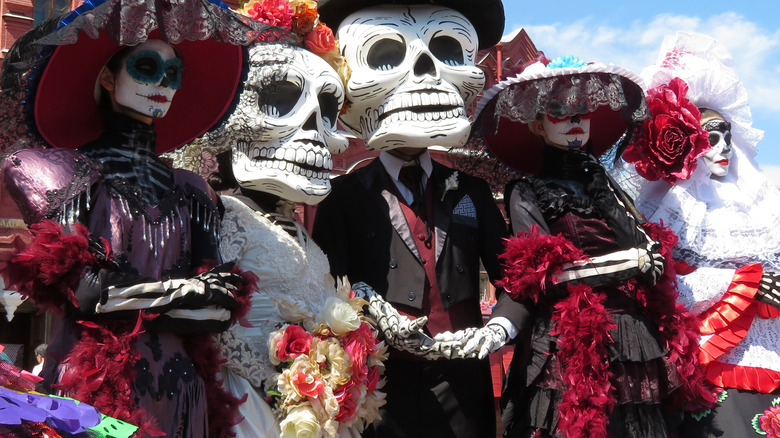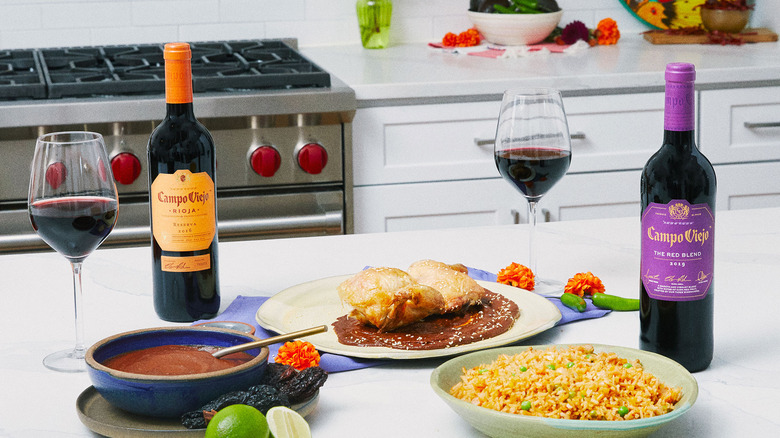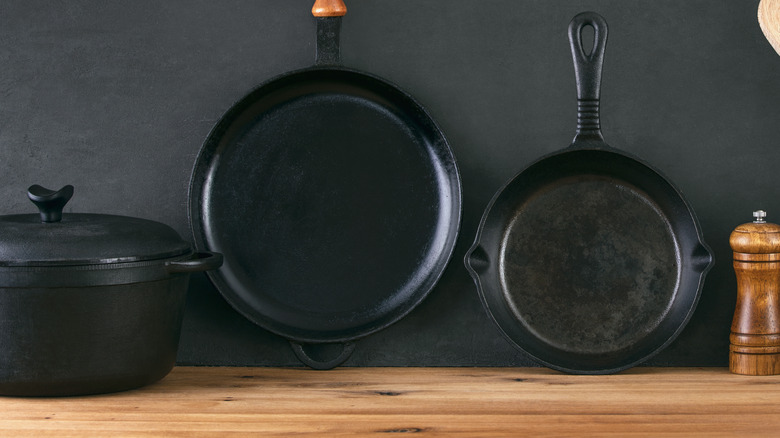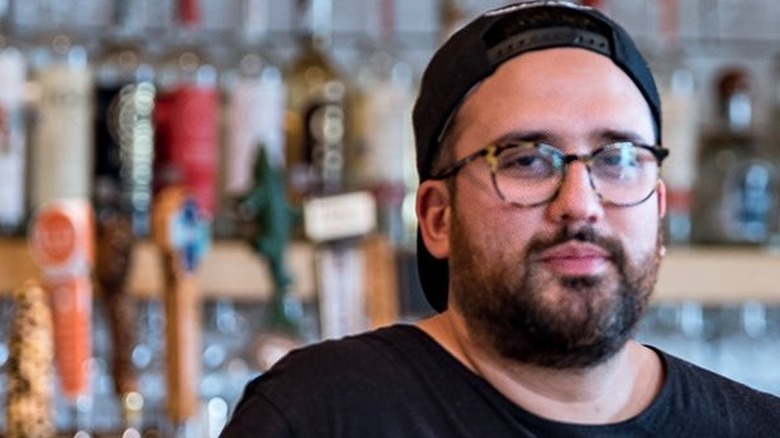What Rick Martinez Wants You To Know About Mexican Food - Exclusive Interview
We may receive a commission on purchases made from links.
Trying to describe chef, author, stylist, and TV personality Rick Martinez using a small number of words is a large challenge. Proud to be an American from Texas, Martinez is also proud of his Mexican heritage. He's a lover of everything from tacos to Christmas cookies. His heart belongs in Texas or south of the border but he often calls New York home. He's proud to be gay. He's proud to have a cookbook coming out soon. He's busy yet calm. He's accomplished yet he remains curious.
In other words, there's a lot going on behind those glasses and underneath that well-coiffed hair. When Mashed caught up with Martinez for a recent interview, what was primarily going on for the chef was a focus on the upcoming Dia de los Muertos, or Day of the Dead, a major celebration in Mexico, and an occasion for which the winery Campo Viejo had approached Martinez to partner and help promote.
There was much more on Martinez's mind than wine or the Day of the Dead, of course. Thus the conversation started back at the beginning: the beginning of the chef's cooking life, that is.
For Rick Martinez, cooking started early
Did you grow up cooking and if not, what first got you interested in it?
I did, actually. My mom was an amazing cook and she would pick me up from daycare and she would go to her bedroom and change. I would basically just pull a chair out from the dining room, put it next to the stove, and stand there and just wait for her to get to the kitchen. And she pretty much taught me everything that I know about cooking and food and TexMex. And I grew up in Austin, Texas. So that was sort of the beginnings. And then I've just always loved to cook ever since being a little kid.
Who or what were your — aside from your mother or including her — some of your earliest inspirations for cooking?
Definitely my mom and my dad. I mean, my whole family, we all were people that expressed love through food. So whether it was a party for friends or a family get-together, that was always the way that you showed that you cared for someone, by making them something. And so that was something that I was taught at a very early age ...
Rick Martinez's favorite things to eat
What is your favorite cuisine to eat and what is your favorite cuisine to cook, if different?
I think probably anything with chilies. I love sweet and spicy. Those are my two favorite flavor combinations. And so I definitely love Mexican food. My great-grandparents and my grandparents are from Mexico, even though my parents and I were born in Texas, but TexMex, I love Mexican food, but really anything [with spice]. I love also Asian flavors a lot, and they have a lot of the same flavor components that Mexican food has, that sweet and really spicy, fresh, acidic, lime, lemon, orange. So those kinds of flavors. So it's something that I love to eat, but it also is something that I love to cook as well.
Do you have a single favorite thing to cook? Whether it's cookies or a mole dish, what's your favorite thing to cook?
Oh my God. I think probably right now at this very moment, I'm thinking a lot about cookies because we're approaching the holidays and I love sweets. I love cookies. If I can get a little bit of spice in there, whether that's a ginger, chili, pepper, or really spicy cinnamon, I'm going to do that as well. But I think a nice, buttery, delicious sweet cookie is where it's at.
How identity informs Rick Martinez's cooking
How does your identity, meaning all facets, being an American, being from Texas, being of Mexican heritage, being in the LGBTQ community, come together to inform your cooking and how does your cooking inform your identity?
Wow, that's a great question. You know, I can't separate out who I am, right? I grew up in Texas, so I ate Tex-Mex food. We were a Mexican-American family. My parents were second-generation, and so they tried very hard to acclimate into American culture, and also Texan culture. My mom also grew up eating and also making chicken and dumplings, fried chicken. My dad barbecued. My first job in a restaurant was at a barbecue shack. So I learned how to smoke ribs, how to smoke brisket, how to smoke chicken, how to make chicken fried steak.
That's all a part of who I am, in addition to the TexMex component. And then as I got older, as I started to really explore not only my gay side, but also just my Mexican identity, and started traveling around Mexico, I developed a very strong love and affinity for all parts of Mexican cuisine, which was very, very different than Tex-Mex. And so it's just all a part of me and everything that I cook is informed by that. Whether it's the fact that I love sweets and I love cookies or whether it's that I love anything really spicy. So all of those flavors come together in almost every recipe that I create.
Rick Martinez on misconceptions about Mexican food
What do you wish more people on this side of the border understood about authentic Mexican cooking?
I think that, because of the prevalence of brands like Taco Bell and Taco Cabana and the prevalence of Tex-Mex food and Cal-Mex and Arizona, New Mexican cuisine, I think those become the standard for what Americans think of as Mexican food. And the reality is that there's so much coastline. There's so much biodiversity. There's so many different geographies and climates within Mexico. There are so many different things, even for me, and I've been going to Mexico for 20 years.
And when I was researching my book, there were things that I didn't know that existed, dishes that I'd never tasted before. And so I really want to expand the palette. I know people in the U.S. love Mexican food, what they know of it. And so this is my way of giving back to the cuisine and expanding the understanding of what Mexican food is, because it's all different. I think a lot of people also think that it can be very heavy. And I think that's mainly because of Tex-Mex and what that is. And the reality is also that Europeans, mainly the Spanish, brought in pigs and cows and dairy and cheese. And so before that, it was a very vegetable-forward cuisine, nuts, fruits, berries, fish. And so it can be very healthy, but the reality is, it's very diverse. And I want to present that to people.
The Mexican dish Martinez wants to share with the world
If there was one authentic Mexican dish you could have everyone in the world try, what would it be?
I think it would be definitely a mole because I think a lot of people misunderstand it or they've tasted something that is not necessarily the best. I think a lot of people think that it's a sweet sauce. It doesn't have to be. Sometimes it's a spicy sauce. Sometimes it's a really nice balance of nuts and chilies and seeds and either a fish stock or chicken stock. Sometimes there's not even chocolate in it. And so I think that tasting a really, really good mole, I think will introduce people to what Mexican cuisine really is.
In just a few words, can you explain what exactly is mole?
I think at its very base level, it is a sauce that is flavored with chilies. There are usually other flavors, other dried spices, nuts, and seeds, but the primary flavoring comes from the chilies. And in some cases, they can be dried as in the case of red or black moles, but then green or white moles can actually use fresh chilies. And so, depending on where you are in the country, that will determine what kind of chilies you use, what kind of nuts and seeds you use, but it's a sauce that's universal and is expressed differently in every region of the country.
What Day of the Dead means to Rick Martinez
What does Dia de los Muertos mean to Mexicans? And what does it mean to you?
I think for me, it was a holiday, but one that I didn't really know about until I was 16. And there was a panaderia in Austin, that I used to go to quite a lot. And when I turned 16 and I had a car, I drove there in October and I was like, "Whoa, there's all this Day of the Dead bread." I had no idea. I never heard of the Dia de los Muertos. I didn't know what it was about, but I encountered pan de muerto at this panaderia. And from that point forward ... I wanted to know more about it. I didn't understand what it was. And even being 16 years old, which was like during the late '80s in Texas, there wasn't a lot written or documented.
I went to the public library and I went to my school library to find out more information about it. When I got old enough to travel into Mexico, I started going down for myself to understand what it is. And to me, the thing that is so astounding about it is it's not only a very different way of treating death — I think in the U.S., we treat death as very final. A lot of times we talk about it as a battle or a fight, and invariably the person loses. And so there's inherently this competitiveness, and Americans don't like to lose. And so when you lose that fight, we try and put it aside, we try and compartmentalize it and not think about it anymore. And the opposite is true in Mexico; when someone passes, that person goes to another place, but that person is also going to come back and visit you once a year.
And your role in that is creating an altar, creating a place of remembrance, remembering all of those things that that person loved and creating that food, that music, that art, and offering that to them so that, when they come back, they're drawn in by the remembrances and the memories. And so, it's really amazing. I've been in cemeteries during Day of the Dead, and I've watched people of all ages, celebrating the life of someone, and you get the sense that that person is there with them. And it's very different than the way that I grew up. My mother passed away 10 years ago, and I struggled with that because I was very close with her. And so now I feel like I have a new way to express those feelings and that emotion, and I have a new way of connecting with her, even though she's been gone for so long.
Why Rick Martinez partnered with a winery
What are the plans there for you in your partnership with the Campo Viejo winery in celebrating the Day of the Dead?
I think, well, it meant so much to me when Campo Viejo approached me and wanted to celebrate the holiday and also celebrate the cuisine, I was really enthusiastic and wanted to jump on board because I feel like people have a very cursory understanding of what it is, myself included before really diving into the research for the book. The food around the Day of the Dead is really, really incredible. So, moles, roasted chicken, the pan de muerto, arroz, rojo, all of those flavors are really, really strong. And another thing that I don't think Americans really think is to pair Mexican food with wine, and there's a lot of vineyards in this country. Wine is a part of the Mexican table, and I feel like a wine like Campo Viejo, with really robust flavors, does actually pair very well with a dish that has so many ingredients and so many strong flavors like a mole. So that was really the reason why I jumped on board and was really excited about it.
How do their wines compare with those of the best-known regions, like France, Italy, or California?
I think that it definitely has its own characteristics. And I think that comes from the terroir of the region that is produced in. I think that it is a very bold wine, and I think that is why I think it pairs so well with these kinds of [Mexican] flavors. This is not something that I would take necessarily — or I guess speaking specifically of the Tempranillo and the Reservas — I don't think that those are wines that are necessarily going to go with something like a poached fish or a poached chicken or something that's very, very neutral.
I think you do want something that's very bold to go with it, that's going to stand up to it, because it could possibly dominate your food. And I think that putting those two things together, you're going to pull out so much of the sweetness out of the mole, so much of the spices that are within the mole, even some of the toasty flavors from the toasted nuts and seeds come out with that, with something like a Reserva that is aged and you pick up some of the notes from the barrel.
Rick Martinez's advice for pro chefs and tips for home cooks
What are a couple of mistakes you see up-and-coming chefs making, and what are some of your best tips for home cooks that want to take things up a notch?
I think from a chef perspective, I think what young chefs always try and do is make their mark and they want to change things. And I have no problem with that. I think it's really cool to be creative and put your personal spin on something. But I think what's important is understanding the origins of the dish that you're wanting to innovate. And I think that once you understand why it's made and how it's meant to taste and the flavors that are present in it because of the location that it was conceived in, then I think you can put your personal spin or your geographic spin on something. But I think understanding where it came from really better informs your dish and it makes your dish not only smarter, but also more cohesive. And it can also give you ideas on how to innovate or change it or create it.
And I think for the home cook question, I think, probably the thing that's [needed]? You need a good skillet, a good Dutch oven, and a good knife. With those three things, you can cook anything and you can improvise around it, but you need something like a cast iron skillet, like a heavy Dutch oven, and just a really, really sharp knife. Doesn't have to be expensive. It can be a $20 restaurant supply store knife, but it needs to be sharp to make your life easier in the kitchen.
Rick Martinez's favorite working chef
Is there a notable chef working today who you admire? Who you'd like to work with or who you just appreciate their work?
There's a chef in Austin, Texas. His name is Fermín Nuñez. He is the owner and chef at Suerte. And I love his food. He is a Mexican immigrant. I think his restaurant and his food is the embodiment of what happens when immigrants go into the United States. You know, he's using the traditional methods that he grew up with, but with ingredients that are local to the Austin central Texas area.
And so when he makes a mole, for example, he's not using plantains or things that you would find in the southern part of Mexico, because they don't grow in Texas, but he's using peaches and pecans and things that exist there, which to me is not only is it brilliant, but then, as an Austin diner, you try it and the flavors become more familiar to you. You know, all of a sudden, you're not eating something that seems very foreign, because the flavors that you grew up with, the flavors that you love are present in that dish. And I think that's some of the ... It's one of the most brilliant dishes. And also he's doing a lot with Mexican varieties of corn and introducing people in Austin to really, really high-quality corn dishes as well, which I think is really important.
Keep an eye out for Rick Martinez's upcoming cookbook "Mi Cocina," follow him on Instagram for cooking tips and recipes, and check out his partnership with Campo Viejo.

